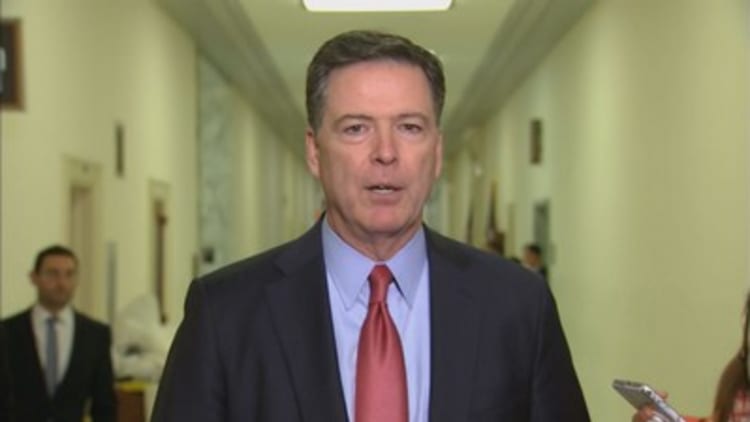A report compiled on online influence operations in the 2016 elections points to an "aggressive" effort by Russia to inflame sentiments on Facebook, Instagram, YouTube and Twitter, with efforts dating back to as early as 2009. Russia increased those efforts as campaigning for the 2016 U.S. presidential election heated up, with the intention of boosting the candidacy of Republicans and then-candidate Donald Trump, the report says.
"What is clear is that all of the messaging clearly sought to benefit the Republican Party — and specifically, Donald Trump," the report says.
The research was conducted for the Senate Intelligence Committee by Oxford University's Internet Institute. It describes an effort by Russia's Internet Research Agency (IRA) to sow discord and polarize voters in the United States by creating and promoting news and opinion meant to amplify the most extreme views held by organizations on both the right and left of the political spectrum.

The report also emphasizes that it is difficult to tell whether these campaigns genuinely persuaded individuals to vote one way or another.
"Understanding precisely how social media platforms impact public life is difficult," the report says.
The report gives a unique look into how the IRA was used to sow discord long before Donald Trump's candidacy, announced in June 2015, and then solidified around themes that would eventually send him to the White House. "These attacks against our country were much more comprehensive, calculating and widespread than previously revealed," said Intelligence Committee Vice Chairman Mark Warner, D-Va.
The IRA campaign began as early as 2009 in Russia, according to the report, with early tweets written in Russian and apparently tested on a domestic Russian audience, according to the report.
"English language tweet activity increased somewhat in early 2014, before ramping up dramatically at the end of 2014 into 2015," the report states.
The report says the IRA created Facebook posts that frequently "expressed tolerance of extremist views," by calling immigrants "parasites," and pitting groups such as veterans and immigrants against one another.
The IRA also used paid Facebook and Instagram posts that mostly targeted African-Americans, followed by white voters divided into liberal and conservative segments, Latin American voters and Muslim voters, with smaller targeted campaigns.

"Facebook uses an auction system to price impressions for different segments, meaning different target interests are priced differently, according to advertiser demand," the report says. "African Americans, Native Americans, Latin Americans, and youth were the cheapest, while ads to conservatives, Muslim Americans and LGBT users were the most expensive. If we look at the amount spent in total, we see that a similar amount was spent on conservatives (a small number of expensive ads) as was spent on targeting African Americans (a large number of cheap ads)."
"This newly released data demonstrates how aggressively Russia sought to divide Americans by race, religion and ideology, and how the IRA actively worked to erode trust in our democratic institutions," said Intelligence Committee Chairman Richard Burr (R-N.C.).
The report says the IRA incited anger among ideologically aligned groups and specific demographic groups, as follows:
- African-American voters were targeted with content "preying on anger with structural inequalities faced by African-Americans," the report says. "These campaigns pushed a message that the best way to advance the cause of the African American community was to boycott the election and focus on other issues instead."
- Conservative voters were heavily targeted with ads focused on anti-immigrant messaging, patriotic messaging and a general sentiment of liberal aims to appease non-Americans at the expense of citizens. This content largely encouraged these individuals to vote for Trump.
- Liberal voters and the LGBT community. These groups only occasionally "sought to drive some of these voters toward Bernie Sanders or third parties. Content was focused on "antagonism towards groups that are perceived as anti-gay."
- Mexican-American voters. These individuals received "limited" contact as part of the IRA's targeted campaign until after the 2016 election, when a organized group called "Brown Power" emerged as an IRA-run group "geared towards increasing distrust in the U.S. political system."
- Muslim voters. Messaging to these voters was more positive than to other groups, including denouncements of terrorist attacks and frequent, positive narrative depictions of Islam and Muslims. The IRA content targeting Muslims, like that created for liberal voters and other minority voters, reflected anti-Clinton themes as well as some material expressing cynicism toward the U.S. government.
WATCH: Comey slams Republicans



